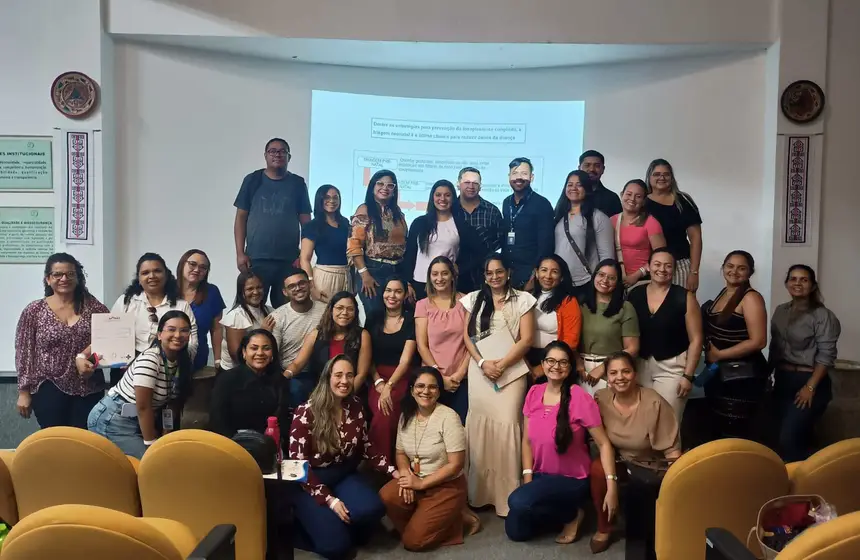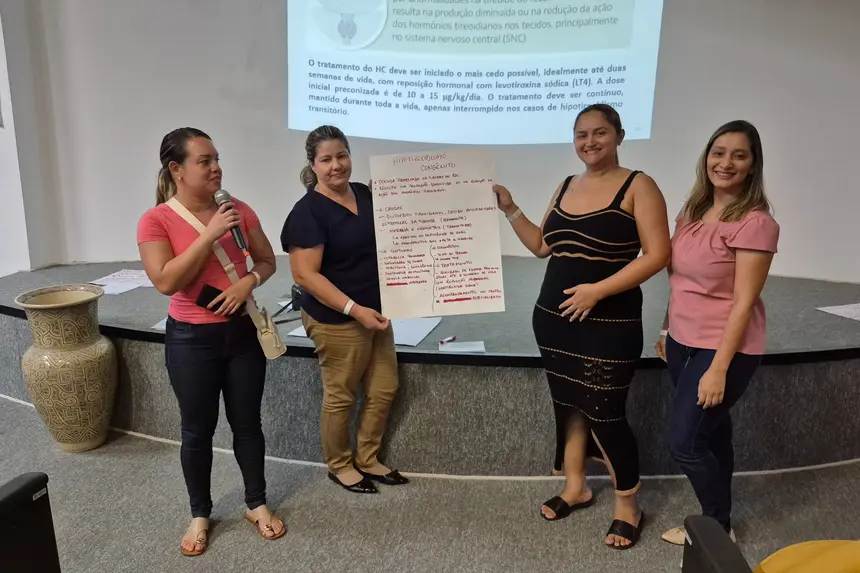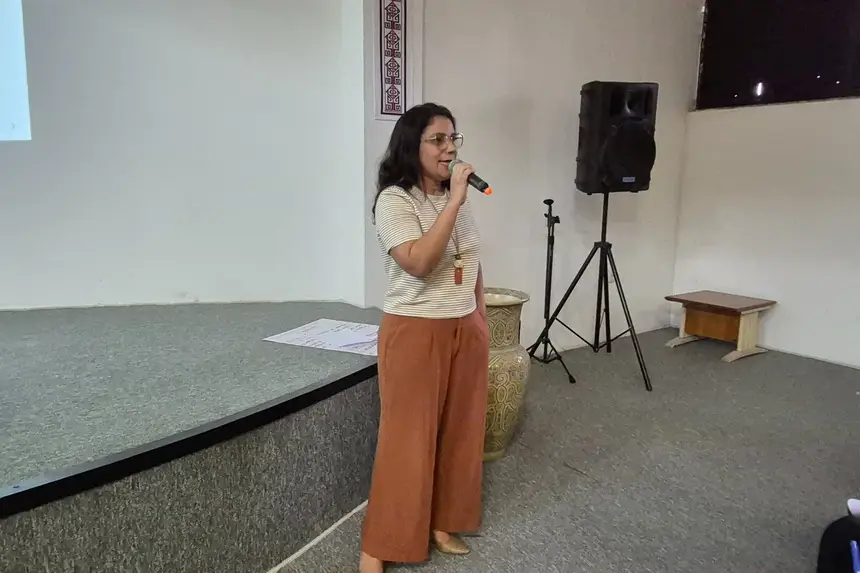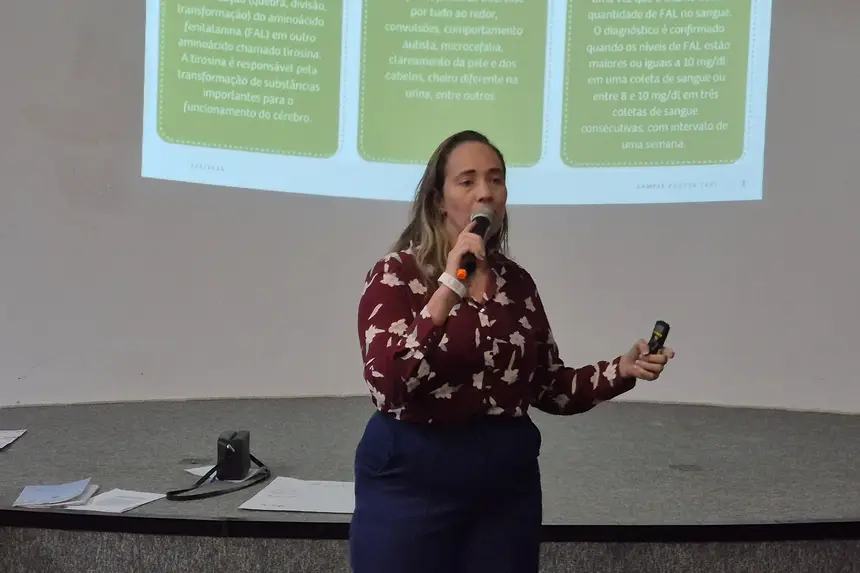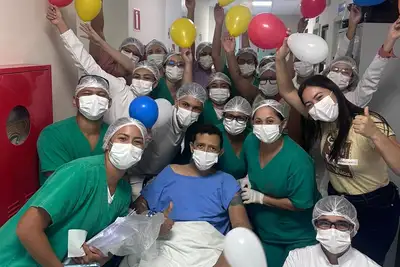Sespa emphasizes the importance of the heel prick test between the 3rd and 5th day of the baby's life
In addition, health services need to communicate more with SUS users about the signs and symptoms of diseases detected in neonatal screening
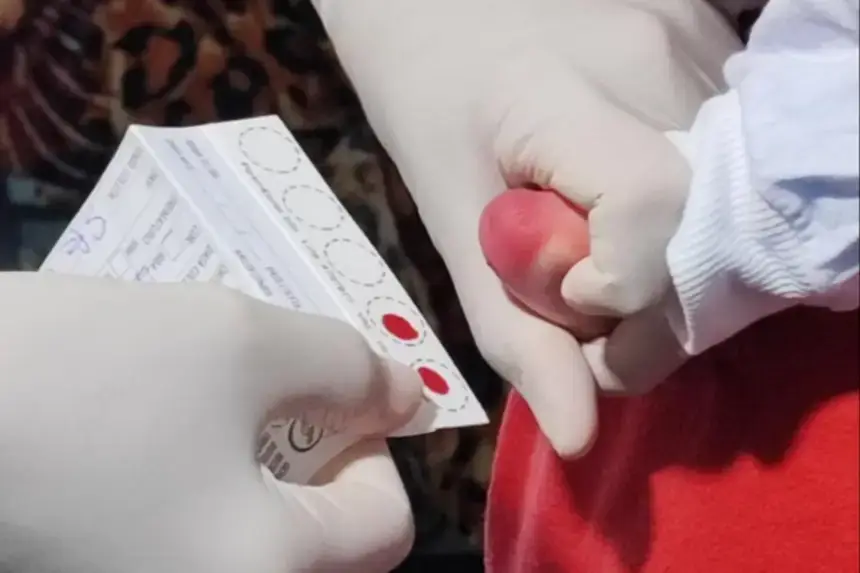
The State Department of Public Health (Sespa) continues to make efforts to ensure that blood collection from newborns for Neonatal Screening (heel prick test) is performed between the 3rd and 5th day after birth, a period recommended by current legislation. This is the first step to guarantee early diagnosis of the seven diseases included in the first stage of the National Neonatal Screening Program (PNTN) for children.
This was one of the main points addressed in the Neonatal Screening Training, conducted by the State Coordination of Child Health (Cesac), from the 2nd until Friday (04), in partnership with the State Central Laboratory, which is the Reference Laboratory for Health Surveillance in the Amazon.
The event included nurses from the Basic Health Units in the municipality of Belém, who are involved in collecting blood samples from newborns.
The coordinator of the Neonatal Screening Service at Lacen-PA, Rosilena Mesquita, stated that these training sessions occur annually, in partnership with Cesac, in all municipalities in Pará that have neonatal screening collection points and send samples for analysis at Lacen-PA. "The main objective is to qualify and update professionals on the new legislation of the PNTN and all aspects involved in the process from collection to delivering the results to the family."
Rosilena Mesquita emphasized that the new legislation expanded the list of diseases screened by the heel prick test, which now operates in a staggered manner in five stages, noting that with the inclusion of congenital toxoplasmosis analysis in December 2023, Pará fully complies with the first stage of the PNTN. "Therefore, it will be up to these nursing professionals to pass on information to the technicians who perform the collection and to support these technicians, not only in collection but also in seeking results and guiding parents about the importance of neonatal screening."
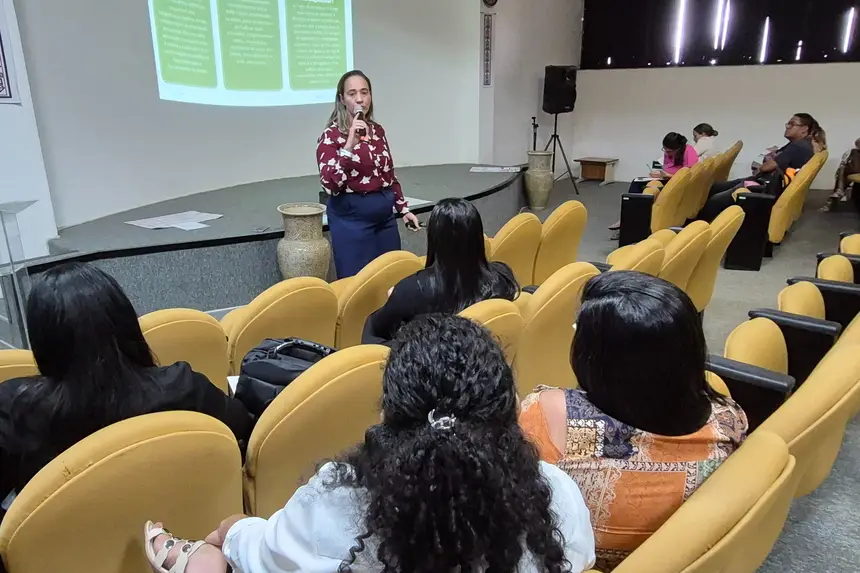
Currently, Pará conducts neonatal screening for the following congenital diseases: phenylketonuria and other hyperphenylalaninemias, congenital hypothyroidism, sickle cell disease and other hemoglobinopathies, cystic fibrosis, congenital adrenal hyperplasia, biotinidase deficiency, and congenital toxoplasmosis.
Difficulties - Regarding the functioning of the PNTN in Pará, one of the concerns is the late collection of blood samples from newborns at health posts and their sending for analysis at the Central Laboratory.
"We have a serious problem with the time it takes for samples to arrive, which should not exist, since the purpose of screening is the early diagnosis and treatment of congenital diseases. The time from when the sample is collected until it reaches the laboratory is crucial," said Rosilena Mesquita.
Additionally, Lacen-PA has also recorded issues with the quality of samples that arrive for analysis. "You already have a diagnosis that needs to be quick, and if you have an inadequate sample, that time will be longer and detrimental to the child. So, the quality of the samples is indeed a critical and fragile point of the service in the municipalities.
She explained that on the filter paper, five blood samples must be collected for the analysis of the seven congenital diseases. "The five circles on the filter paper must be filled with blood uniformly and homogeneously. The blood needs to be absorbed by the filter paper, which is made of cotton fiber. Therefore, the quality of this drop must be precise," she stated.
Data - According to the Annual Data Report of the PNTN, in 2024, 94,244 children underwent neonatal screening in Pará, of which only 31,152 (33%) had the test done between the 3rd and 5th day after birth. 27% had the test done between the 6th and 8th day, 21% between the 9th and 14th day of life, 13% between 15 and 30 days, and 1% after 30 days of birth. Hence the importance of greater dissemination about the ideal collection time and the diseases that can be detected early with the test.
Role of Primary Care – Nurse Nayara Matias, Reference for Maternal and Child Mortality at Fiocruz, one of the trainers of the course, emphasized that Primary Care professionals (APS) need to talk to families not only about the importance of neonatal screening but also to detail the severity of congenital diseases that can be diagnosed early, thus providing better quality of life for children.
One of the specialist's suggestions is for Primary Care to conduct active searches in communities. "Active search is very important, especially to collect samples from the third to the fifth day of life and ensure coverage of 70% of newborns during this period as recommended by the Ministry of Health," said Nayara Matias.
One suggestion from the nurse is for the health unit to monitor pregnant women to know when the delivery will occur and to follow up with them to ensure the test is done. "We need to do it between the third and fifth day of life, whether through collection at the health unit or at home," she stated.
Considering the various challenges families currently face, Nayara Matias believes it is time for APS to revive home care, that is, to bring health services to the homes of SUS users. "The population has a lot of difficulty reaching the health unit, whether due to access, public transport, or geographical issues like living on islands. So, having the professional bringing the service there and conducting active searches, I believe we can improve our coverage," she opined.
According to the trainer, health units have the capacity to know the entire population in their coverage area, to provide essential services and information to families. "Neonatal screening needs to strengthen Education and Health actions, providing information about what diseases I am testing for, what the signs and symptoms are, and what the complications are. Because we are talking about genetic diseases that have serious impairments, including intellectual disabilities. It is necessary to provide information and raise community awareness. I strongly believe in the power of information. When I empower families with information, they will seek out this service themselves," she argued.
Today, families know they need to do the heel prick test, but often they do not have the correct information. "Sometimes, they have information that it is until the seventh day of life, others until 30 days of life. And they do not know why they need to do it. We need to explain that it serves to detect diseases early, which, although they have no cure, can be controlled, allowing for a better quality of life for the child," reported Nayara Matias.
She believes that when information is provided, users will spread the word, passing it on to others. "And thus, we will have greater adherence to the service itself," she concluded.
Treatment - Sespa emphasizes that all children with confirmed diagnoses are monitored by the Neonatal Screening Reference Service (SRTN) at the Specialized Maternal-Child and Adolescent Reference Unit (Uremia), where they receive multidisciplinary follow-up to prevent complications and sequelae related to the identified diseases.
Currently, the following patients are receiving regular follow-up at the SRTN: 50 patients with phenylketonuria, 563 with congenital hypothyroidism, 99 with sickle cell disease, 04 with cystic fibrosis, 42 with congenital adrenal hyperplasia, 05 with biotinidase deficiency, and 55 with toxoplasmosis.
Learn more about the diseases detected in neonatal screening:
- Congenital Hypothyroidism: An inherited disease that prevents the thyroid gland from producing the thyroid hormone T4, essential for the physical and mental growth and development of children.
- Phenylketonuria: A disease in which the body cannot properly process the amino acid phenylalanine, leading to intellectual disability and other serious problems if untreated.
- Sickle Cell Disease: A change in red blood cells that causes anemia and can lead to serious complications due to the abnormal shape of the cells.
- Cystic Fibrosis: Characterized by the accumulation of thick secretions in the lungs and digestive tract, affecting breathing and digestion.
- Congenital Adrenal Hyperplasia: Refers to several genetic diseases caused by enzyme deficiencies in the synthesis of adrenal hormones, impacting normal growth and development.
- Biotinidase Deficiency: A rare disease that prevents the absorption and regeneration of biotin, an essential vitamin for metabolism.
- Congenital Toxoplasmosis: An infection transmitted from mother to fetus, causing lesions in the central nervous system and retina.


